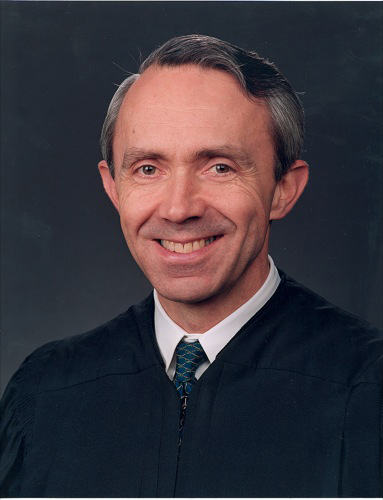What has Justice Souter done for you?

One of the nine U.S. Supreme Court justices is retiring in June, 2009. David Hackett Souter (age 69) was appointed to the Court in 1990. He has participated in and written many decisions including several that have affected the lives of children and teenagers. When justices are appointed to the Court, they may stay for as long as they wish. For example Justice John Paul Stevens retired at age 90 in 2010.

Photo from U.S. Supreme Court Collection
In Morse v. Frederick, (2007), Justice Souter joined the dissent in a student free speech case about displaying a banner at a school-approved event.
 Joseph Frederick held the banner that read “Bong Hits 4 Jesus” across the street from his high school in Alaska. Souter sided with Joseph in that his expression did not expressly advocate conduct that was illegal or harmful to students.
Joseph Frederick held the banner that read “Bong Hits 4 Jesus” across the street from his high school in Alaska. Souter sided with Joseph in that his expression did not expressly advocate conduct that was illegal or harmful to students.
Justice Souter wrote the majority opinion in Beth Ann Faragher v. City of Boca Raton (1998).
 Beth Ann was a young lifeguard who suffered sexual harassment at work by her male supervisors. The Court held that sexual harassment so severe as to create a hostile work environment is prohibited by law. This includes offensive sexual language and gestures.
Beth Ann was a young lifeguard who suffered sexual harassment at work by her male supervisors. The Court held that sexual harassment so severe as to create a hostile work environment is prohibited by law. This includes offensive sexual language and gestures.
In another harassment case, Souter joined in a dissent in Gebser v. Lago Vista School District (1998). Alida Gebser was a 13-year-old eighth-grader subjected to continuous sexually suggestive comments by one of her teachers.
 The sexual harassment at school progressed to kissing, fondling, and eventually sexual intercourse. The Supreme Court held that a school district cannot be held liable for the acts of its employees unless it knows about the misconduct and fails to act. Alida didn’t report the ongoing violations by her teacher until they were caught in a car by the police. The teacher was fired and lost his teaching license. Justice Souter believed that schools shouldn’t be allowed to claim ignorance of misconduct and thereby avoid responsibility for harm imposed on students.
The sexual harassment at school progressed to kissing, fondling, and eventually sexual intercourse. The Supreme Court held that a school district cannot be held liable for the acts of its employees unless it knows about the misconduct and fails to act. Alida didn’t report the ongoing violations by her teacher until they were caught in a car by the police. The teacher was fired and lost his teaching license. Justice Souter believed that schools shouldn’t be allowed to claim ignorance of misconduct and thereby avoid responsibility for harm imposed on students.
In the case of Vernonia School District v. James Acton (1995), Souter again joined in a dissent in a case about random drug-testing at school.
 12-year-old James and his parents challenged the school’s policy that required student athletes to test at the beginning of the season and on a random basis throughout the school year. The Supreme Court upheld the policy as reasonable and not an unlawful invasion of the student’s privacy. The dissent believed that suspicionless searches of all athletes swept too broadly and was unreasonable under the 4th Amendment.
12-year-old James and his parents challenged the school’s policy that required student athletes to test at the beginning of the season and on a random basis throughout the school year. The Supreme Court upheld the policy as reasonable and not an unlawful invasion of the student’s privacy. The dissent believed that suspicionless searches of all athletes swept too broadly and was unreasonable under the 4th Amendment.
Justice Souter joined the majority in Lee v. Deborah Weisman (1992) in ruling that prayer at a public school graduation ceremony did amount to a state-approved religious exercise. Consequently, forcing a student to participate violated the First Amendment and was therefore unconstitutional.
 14-year-old Deborah objected too late to stop the prayer and blessing at her 8th-grade graduation, but it wasn’t repeated when she graduated from high school four years later.
14-year-old Deborah objected too late to stop the prayer and blessing at her 8th-grade graduation, but it wasn’t repeated when she graduated from high school four years later.
We wish Justice David Souter all the best in his retirement and thank him for his contribution to the youth of America.


